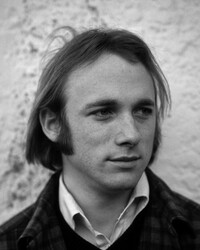Armovir 2.0: The power-OCU embrace is getting tighter
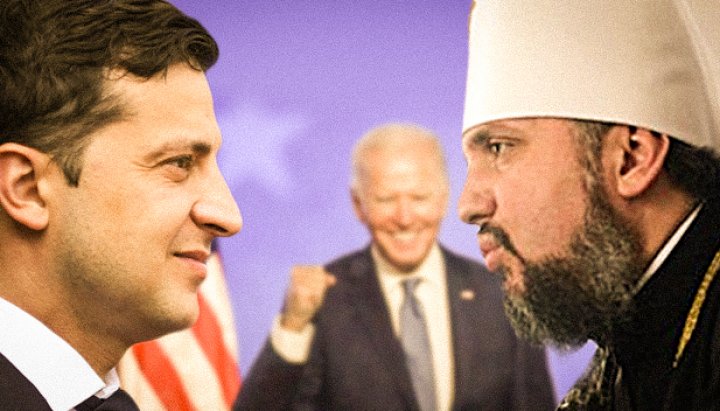
We see that the current government is taking more and more "Poroshenko" steps in support of the OCU. Why is it doing this and what can we expect next?
On March 6, 2021, the “Servants of the People: delegation visited Phanar, where they conveyed birthday greetings to Patriarch Bartholomew from the President and Sergei Dumenko, as well as an official invitation to visit Ukraine.
The curator of this trip was the deputy head of the President's Office, Kirill Timoshenko, and the odious people’s deputy from “Servants of the People” Bogdan Yaremenko was appointed head of the delegation. The latter, during his work in the parliament, is remembered only for a loud and shameful scandal, when, during a session, journalists filmed his correspondence with a prostitute. The MP then tried to deny everything but later he apologized to his wife, children, voters and the President. Despite the apology, the faction then decided that Yaremenko's moral character was not high enough and dismissed him from the post of head of the Rada's Committee for Foreign Policy and Inter-parliamentary Cooperation.
Nevertheless, it was Bogdan Yaremenko who was honoured to be the head of the delegation and address Patriarch Bartholomew. In his speech, he called himself a child of the head of the Phanar, was glad that the number of the "Servants of the People" MPS coincided with the number of the apostles of Christ, said that Patriarch Bartholomew’s visit to Ukraine is necessary because "our people are still fighting for independence", and admitted that regularly discussed with Patriarch Bartholomew "the prospects for the unification of the Orthodox Church of Ukraine".
In other words, Yaremenko confirmed what had been suspected for a long time – the current Ukrainian government has been negotiating with the Phanar for a long time and follows in the steps of the previous government. It was hard to believe in this until the very end since Vladimir Zelensky and Sergei Dumenko stood "on the opposite sides of the barricades" yesterday. Not in the sense that the current President was somehow at odds with the OCU, not that case, but earlier he clearly declared his position on non-interference of the state in the affairs of the Church. Moreover, his predecessor and the main rival in the presidential election, Petro Poroshenko, did not just interfere in church issues – he made this interference a "trick" of his election campaign.
And although so far the relationship of the current government with the OCU has been not as passionate as that of Petro Poroshenko, the progress compared to how the relationship between Zelensky and Dumenko began is impressive. However, let's remember everything.
You remember how it all began…
Spring 2019 was not just a season for Ukrainians. It was a spring of hopes for a global renewal of the country. Ukraine longed for a wind of change that would dispel the suffocating, even stifling atmosphere that has enveloped the country in recent years. The presidential elections caused a huge resonance in the country. Zelensky against Poroshenko. The huge out-vote (73% against 24%), with which the actor defeated the former president, demonstrated the obvious – everything related to the previous government did not find support from the overwhelming number of Ukrainians. And the question here was not that the people expected a lot from Vladimir Zelensky (he had never been in politics before), the Ukrainians simply could no longer endure the rule of Poroshenko and what was connected with this rule.
And everything that the former president proposed to the people was put into one single slogan, nicknamed by the people “Armovir”: “Armia! Mova! Vira!" (“Army! Language! Faith!" – Trans.) and also "Get away from Moscow".
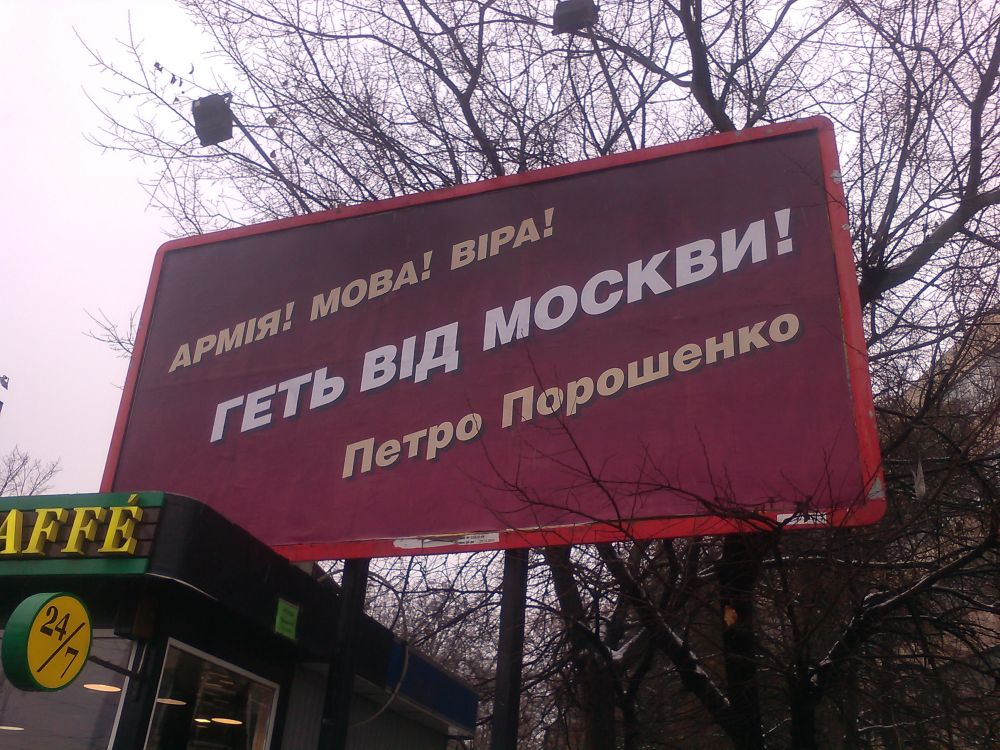
One of the elements of this slogan ("faith!") was the OCU. The fact that the creation of this structure took place within the framework of the presidential election campaign of Petro Poroshenko. Back in spring 2018, Poroshenko's political strategist Taras Berezovets spoke about this openly: “We can say that this is a common pre-election technology. And it will be true."
On December 15, 2018, during the "Unification Council" of the OCU, Sofia Square in Kyiv was filled with thousands of people with the same Ukrainian flags. The entire city centre was crowded with buses and additional carriages with "believing" state employees were attached to the trains.
Well, when, after receiving the Tomos, Poroshenko, together with Epiphany, toured around the cities of Ukraine as part of his election campaign, there could be no doubt: Petro Poroshenko created the OCU with the sole purpose of securing his victory in the new presidential term.
Therefore, during (and immediately after) the presidential elections, the OCU and Sergei Dumenko were clearly associated as part of the Petro Poroshenko team. Certainly, Dumenko positioned himself that way.
- He went with Poroshenko on "Tomos-tours" (as the journalists called the campaign trips to the cities of Ukraine), where he practically performed the functions of an agitator for Poroshenko as a candidate for the presidency of Ukraine.
- He assured that he sees "only President Poroshenko" as the head of the country.
- He stated that the name of Poroshenko is on a par with the Baptist of Russia, the Holy Prince Vladimir.
- He argued that Poroshenko was "a model leader" for him.
Epiphany also had less "direct" hints about who should be elected president: that our victory over the aggressor country depends on the elections, that it is necessary to choose the one who "will take the blow", and so on. All roads were hung with billboards, in which Dumenko was depicted next to Poroshenko and the text of the Tomos. In a word, Sergei Dumenko did everything possible and impossible for him to make Petro Poroshenko the President of Ukraine again.
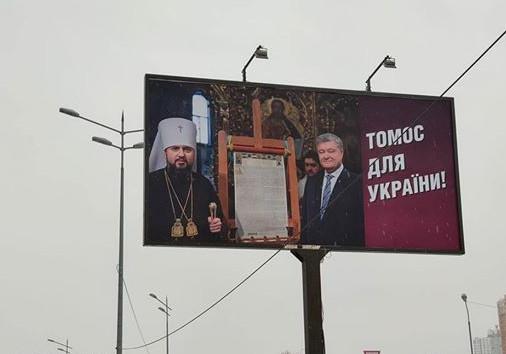
Even representatives of the Poroshenko government reported that his Office directly instructed the “rectors” of OCU churches on how to campaign for Pyotr Alekseevich. This, in particular, was stated by the Deputy Chairman of the Verkhovna Rada Oksana Syroid.
At the same time, members and supporters of the OCU launched an outrageous campaign in the media and social networks against Zelensky. The Ukrainians were threatened that those who voted for Zelensky "will burn in hell", vied with each other in apologizing for the joke about comparing the Tomos with a thermos, insulted in every possible way and campaigned not to vote "for the clown".
Epiphany himself, within the diplomatic framework available to him, said his "fie" towards Zelensky, stating that he had not heard a word of support from him for the OCU: “Unfortunately, I personally did not hear from the candidate’s lips that he supports the Orthodox Church of Ukraine. And we always appreciate not promises. We appreciate the real deeds that have been done so far and will be done in the future."
In a word, Sergei Dumenko, together with the OCU, was part of the Petro Poroshenko political team and was ready for only one development of events – the victory of his patron.
Therefore, after Vladimir Zelensky came to power, Sergei Dumenko was completely at a loss. His boss suddenly found himself out of work, moreover, with very vague prospects, formulated in the famous saying "when spring comes we’ll start putting in (jail)", Sergei Petrovich felt uneasy. Therefore, even after the first round, when it became clear that Poroshenko had no chance, the head of the OCU hastened to distance himself from his patron and said that he “practically does not see” Pyotr Alekseevich, and his structure does not campaign for Poroshenko in the presidential elections.
And after the complete defeat of his patron, Dumenko literally did not know what to say and how to act. It came to the comical situation.
In May 2019, Vladimir Zelenskyy asked religious leaders to be filmed with a "message of peace" for the Crimea and Donbass. Everyone agreed, even the "ultra-patriotic" head of the UGCC Sviatoslav Shevchuk. Sergei Dumenko, after much reflection and hesitation, refused to participate because he was asked to pronounce the text that "we need to stop talking in the language of cannons and guns". He worried that his words might be perceived as a call for peace talks in the Donbass. It even didn’t occur to Epiphany that for the “primate of the Church” the call for peace in the country should be the ardent desire of his heart.
And the identity of the new President, unlike the old one, was a complete mystery to him. With Poroshenko, everything was simple and clear – Dumenko voices everything that is required of him, in response, the OCU receives full support from the authorities on all issues. And now? What, for example, did this mysterious phrase of Zelensky mean: “Don't look for me in church. Look for God!”? Why does this strange man not come to "divine services", does not take joint photos, refuses mutually beneficial cooperation?
All this Sergei Petrovich Dumenko absolutely could not understand. It was felt that he was suffering internally, especially since the "global transfers" to the OCU from the Ukrainian Orthodox Church suddenly stopped abruptly. So strangely it coincided – the old government has left, and the desire of the UOC communities to move to the Dumenko structure has gone.
But time passed. And when it became clear that no one was going to jail anyone in spring, the head of the OCU grew bolder and even began to position himself as an opponent to the authorities, expressing cautious critical theses.
In particular, Epiphany complained that the state at the level of regional administrations “has no desire to re-register” communities that “expressed a desire” to move to its structure. According to Dumenko, “to a certain extent, it is illegal and unlawful. Everyone must act within the framework of the law that operates in the Ukrainian state". Moreover, Dumenko himself said then that there were legal proceedings in cases of seizures and illegal registrations.
When, under Poroshenko, the authorities drove the entire village, including Baptists, Uniates and atheists, to village councils and clubs and held a “meeting of the religious community” there, and then broke down doors in churches, throwing out parishioners, it was legal. And when the new authorities were in no hurry to legalize all this, it became unlawful.
"The previous government was more responsible for the church, - and now ... sometimes there is no such assistance and specific aid at the local level," complained Sergei Dumenko.
The West will help us
However, the situation soon began to improve for the OCU. With a creak, the state machine again began to turn towards the OCU. A serious starting point for such a turn can be considered the visit of the head of the US Department of State Michael Pompeo, which followed in January 2020. Pompeo met with Dumenko and signed an agreement on bilateral cooperation with him.
It's no secret that the United States is the "leading partner" for our politicians. Getting American support is a vital task for any politician of any rank, including the President.
“Pompeo’s words are a formal symbol that the United States supports the OCU. For the Ukrainian political elite, this is also a certain signal for action: if you want to have support from America, you must support the new church structure in Ukraine,” political expert Ruslan Bortnik explained at that time.
The spring and summer of 2020 passed without any significant changes, and in the autumn the whole world (and Ukraine especially) was looking forward to the presidential elections in the United States. Active events unfolded in relations between the authorities and the OCU.
Yurash – the Phoenix bird
Andrey Yurash, a very valuable associate in the Petro Poroshenko team, long-term head of the Department for Religious and Ethnic Affairs of the Ministry of Culture, played a serious role in turning the new government towards the OCU. His contribution to the formation of the OCU cannot be overestimated. It was through his mediation that it was possible to register the OCU under the name of the UOC, it was he who in every possible way prevented the registration of the statutes of UOC eparchies and monasteries, he even acted as an expert in the persecution of UOC priests by the SBU. Simply put, Yurash wrote denunciations.
Metropolitan Clement of Nezhin and Priluki said about him as follows: “Yurash shamelessly voiced calls aimed at humiliating the believers of the Ukrainian Orthodox Church. There are many criminal cases related to the physical beating of believers. His department blocked the possibility of registering the communities of the UOC, which were constantly created in our Church. Even though such actions were appealed in court, the litigation has been lasting for years, and the Ministry of Culture continues its policy."
In 2019, the Department headed by Yurash was abolished. But he desperately fought for the post of head of the structure that replaced it – the State Service for Ethnic Policy and Freedom of Conscience. He fought and lost to Elena Bohdan. Andrei Yurash even sued the winner but to no avail.
Andrei Yurash seemed to be a “downed pilot” to be forgotten soon in Ukraine. But it never happened.
In October, it became known that a new structure was created for Yurash and his team from the former Department for Religious Affairs, and not just anywhere – but under the Secretariat of the Cabinet of Ministers of Ukraine. In other words, the person who, under Poroshenko, was the main mediator between the OCU and the government, received even greater powers from Zelensky than before. And it was a serious warning sign, saying that in the church issue everything was going back to the way it had been before.
The old Patriarch and the new President: such an unexpected love
On August 8, 2019, Vladimir Zelensky visited Phanar and met with Patriarch Bartholomew. The meeting ended in a scandal. The President refused to sign a joint document prepared by the Phanar in cooperation with the Foreign Ministry (Poroshenko's personnel). Phanariotes looked bewildered, saying there was "nothing like that" in the document. The President's Office refused to comment on the incident.
But it is easy to assume that Zelensky would hardly have gone to a scandal if the document had not had points unacceptable for him (and Ukraine). In general, you must agree that this incident is not the best start for the development of friendly relations between Vladimir Zelensky and Patriarch Bartholomew.
All the more unexpected was Zelensky's next visit to Phanar, in October 2020. Or rather, its atmosphere became unexpected. The President attended the service, thanked Patriarch Bartholomew for "unconditional personal support for the sovereignty and territorial integrity of Ukraine, our independence" and, most importantly, invited him to Kyiv.
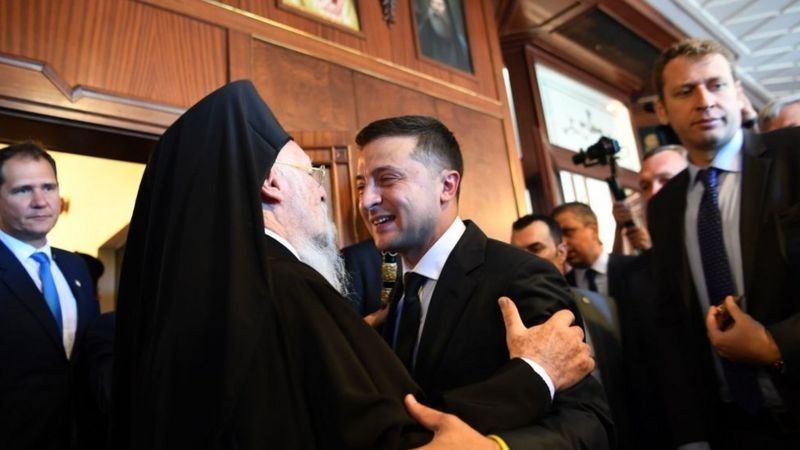
Just a month later, Phanar was visited by the Prime Minister of Ukraine Denis Shmyhal. If Zelensky was still quite diplomatic in his formulations regarding the OCU and the Phanar, Shmyhal spoke with Patriarch Bartholomew in the same style as Poroshenko, Speaker Andrei Parubiy and other representatives of the previous government did. He thanked the Patriarch "for granting the Tomos of autocephaly to the Orthodox Church of Ukraine and supporting the process of its recognition by other Local Churches".
It would seem, well, why should an official of a secular state in which, according to the Constitution, the authorities are obliged to treat all denominations equally, care for the Tomos of the OCU and its recognition? But Shmyhal speaks as if the OCU were part of the state apparatus, which the authorities must support and promote. Moreover, he officially said to the head of the Phanar that the state finances the OCU! And unofficially (as reported to the UOJ by sources in the Cabinet of Ministers), Shmyhal promised Patriarch Bartholomew that the authorities would "transfer" churches and parishes of the canonical Ukrainian Orthodox Church to the OCU, moreover, he said that he would personally supervise these activities.
Therefore, when Andrei Yurash expressed the idea that Shmyhal's visit was a sign that the current government confirmed the agreements between the Phanar and the previous government, no one was surprised. Yurash knew what he was talking about.
The Ukrainian Foreign Ministry is also acting in line with this course. Almost every month we see open propaganda of the OCU by our diplomats. The ambassador to Israel regularly tries to discuss with the Jerusalem Patriarch the “development of the OCU”, the ambassador to Serbia reposts “fraternal congratulations” by Sergei Dumenko to Patriarch Porfirije, the embassy in Montenegro says that “the only Primate of the autocephalous UOC” is Epiphany Dumenko. As for the ambassador to Turkey, he has been there since the time of Poroshenko and actively participated in the Tomos negotiations.
In this light, the visit of 12 MPs from the “Servants of the People” party to Phanar looks quite logical. Zelensky decided to go in the same direction as Poroshenko. But why? After all, it is quite obvious that such actions are unlawful.
Power-OCU merger and the law: why is it incompatible?
We remember Zelensky before and immediately after the presidential elections. He was the complete opposite of Poroshenko – he gave the impression of an honest, open and sincere person who came to power in order to completely change the country: to stop the war, to end hostility and hatred, to imprison criminals and remove corrupt officials. But so far none of this has happened. Moreover, we are witnessing a drift in the opposite direction: “without trial and investigation”, TV channels are closed, opposition politicians are being pressed, and so on.
It is quite logical (unfortunately) that against this background the authorities do not notice such a "trifle" as a violation of the Constitution in relation to the church issue.
The Union of Orthodox Lawyers stated the following in this regard: “Once again, we state violations by the current government of the Basic Law – the Constitution of Ukraine. So, Art. 35 CU stipulates that the Church and religious organizations in Ukraine are separated from the state. At the same time, Boris V. Yaremenko, allowing gross interference in the affairs of the Church and religious organizations of Ukraine, lacking competence and authority, on behalf of the President of Ukraine and its citizens, turned to Patriarch Bartholomew with an official invitation of the latter to celebrate the Independence Day of Ukraine."
In addition, in the actions of the people's deputies, lawyers saw signs of criminal offences, “namely: the unauthorized appropriation of power (Part 1 of Article 353 of the Criminal Code of Ukraine) and violation of the equality of citizens based on their religious beliefs (Part 3 of Article 161 of the Criminal Code of Ukraine)".
Indeed, there is a clear violation not only of the Constitution but also of a number of other legislative acts of the country. But will anyone pay attention to such "little things"? Indeed, the stakes are very high for the authorities. What are they?
Why does Zelensky need this?
Ruslan Bortnik, Director of the Ukrainian Institute of Politics, told the UOJ that Zelensky's new line on the “church issue” has a completely clear explanation – the search for the sympathy of the new US leadership.
“The group of supporters of the OCU and the President’s Office – in particular Kirill Timoshenko (deputy head of the OP – Ed.), who hopes to build relations with the United States through the OCU, visited Bartholomew, thus demonstrating their political position, trying to show loyalty and probing the opportunity through Bartholomew to build relations with the new US administration,” said the expert.
Bortnik's version looks more than reality-like. We recall that Zelensky's last visit to Phanar took place just when it became clear that Joe Biden was defeating Trump in the presidential election. And in recent years, Ukraine's connection with "American friends" has been obvious. Vladimir Zelensky just needs to enlist the support of Joe Biden. And why not do this through Patriarch Bartholomew because his friendship with the new US President is well known.
Suffice it to recall Biden's words that the head of the Phanar is "like Christ". Also, according to the Phanariotes themselves, Joe Biden is "very loyal and friendly with the Greek-American community". This is manifested in the fact that the newly elected President of the United States likes to call himself "Bidenopoulos".
In turn, the head of the Phanar counts very much on Biden's support. He is delicately silent when the new US President makes another statement in support of LGBT or abortion, and actively supports less controversial decisions.
In a word, most likely, the "church evolution" of Vladimir Zelensky is explained precisely by the search for the friendship of "American partners". But what can Patriarch Bartholomew request for his "intermediary services"? Ruslan Bortnik argues that at a meeting in Kyiv between Zelensky and Bartholomew "issues related to the Phanar’s property in Ukraine and joint steps aimed at strengthening the OCU and reducing the influence of the UOC can be discussed".
According to Konstantin Bondarenko, Patriarch Bartholomew will demand that Zelensky fully "continue the policy that was started under Poroshenko".
How should believers of the UOC take all this?
Of course, many members of the Church are experiencing such a "church transformation" of Vladimir Zelensky very painfully. After all, the absolute majority of believers voted for him in the 2019 presidential elections, hoping that with the arrival of the new president, Poroshenko persecutions will become a thing of the past. To some extent, their hopes were justified. But not for long. Is it worth grieving over this? Of course, not.
We must remember how this world is globally arranged and who is actually fighting against the Church: today or a thousand years ago, who will be at war with Her until the end of the century. Persecuting the Church is normal. It has always been, is and will be.
Despite their apparent power, politicians and presidents are just puppets in the hands of much more powerful forces. Therefore, again and again, we have to recall the well-known lines of the Psalter: "Do not rely on the princes, on the sons of man".
Well, the main words that we should remember are even better known: "Take counsel together, and it shall come to nought; speak the word, and it shall not stand: for God is with us."










